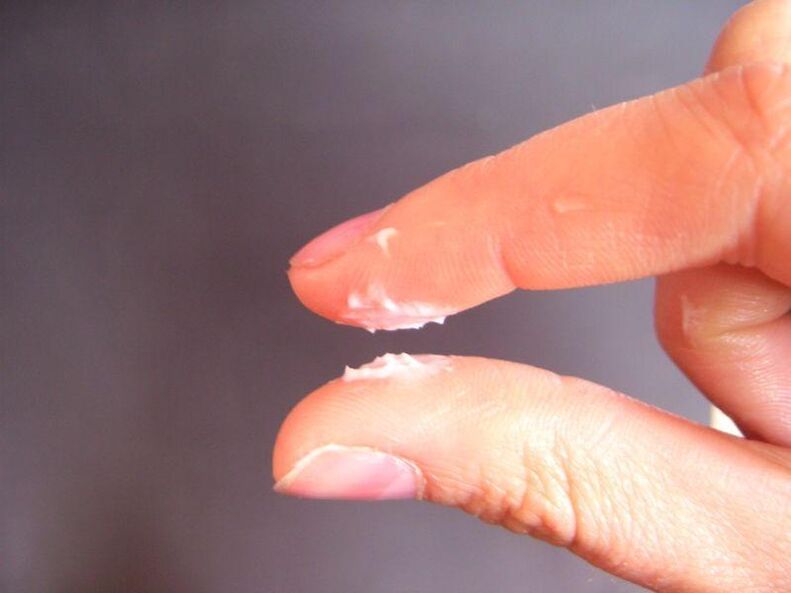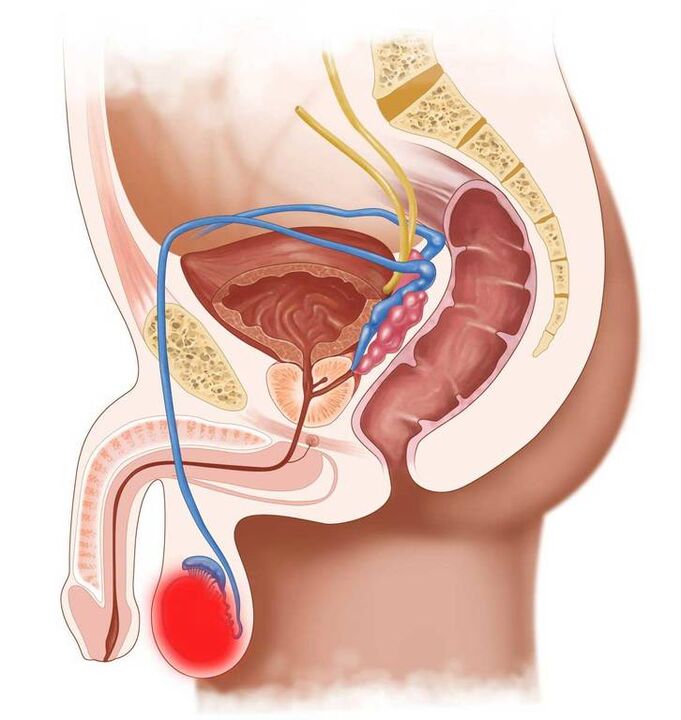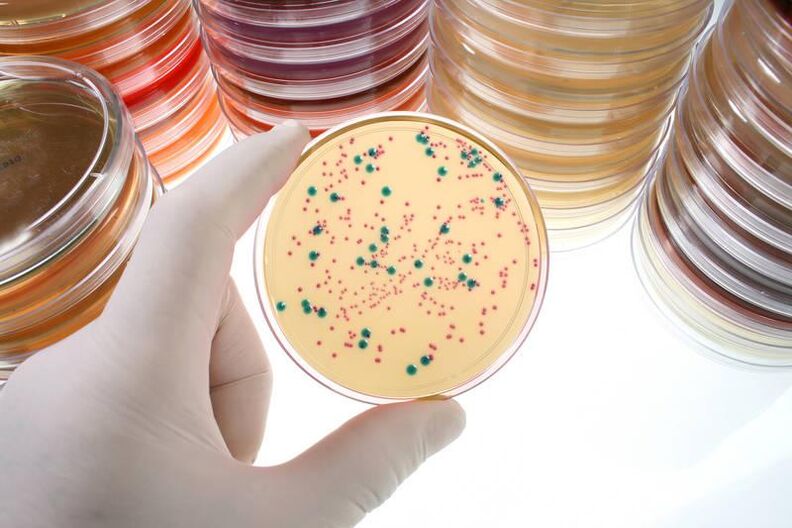A natural physiological process is to allocate a small number of urinary tracts in males. This is a lubricant that is the result of the work of glands that are concentrated in the head of the penis. Rich, uneven consistency and cloudy color are signs of pathological disorders of the genitourinary system.

Changes in the color, consistency, or amount of urethral discharge in men indicating a genitourinary disorder
male normal discharge
Continuous white or colorless fluid on the foreskin of the penis. It can come out of the urethra gradually under pressure, sometimes spontaneously.
Table "Standards of normal secretions in men"
| discharge type | feature |
|---|---|
| Smegma | Produced by the prepuce glands, the lubricant has the consistency of sour cream and is white in color, sometimes with yellow or green tinges. The secret to fat and bacterial residue is to keep the foreskin from rubbing against the head. Abundance depends on age - maximum fluid volume in adolescence, minimum fluid volume (almost nonexistent) in old age |
| Colorless discharge that looks like clear mucus (libido urethral leak) | Mucus is produced by the urethra and bulbourethral glands during an erection (when aroused). Their purpose is to lubricate the urethra so that semen can pass through it unimpeded. The amount of discharge is usually small, but may increase, depending on the abstinence of sexual contact (the less often a man has sex, the more pre-sexual discharge - sometimes it drips from the penis). Is it possible to get pregnant from these discharges? Actually not, because they contain too little sperm. But repeated unprotected intercourse after ejaculation can lead to conception |
| Ejaculation (ejaculation) not related to sexual intercourse | Spontaneous ejaculation occurs in the morning (when blood testosterone levels are highest). A similar phenomenon occurs during sleep. Contamination is most common in adolescents, but can also occur in adult males who do not have regular sexual intercourse. |
| Clear discharge from the urethra (prostatitis) | The components of the secretion are semen and prostatic secretions. During defecation and coughing, fluid flows out of the urethra with strong tension. Vitreous discharge from the penis even after urine has passed - this is normal |
Cloudy discharge or the acquisition of an abnormal shade is the first symptom of genitourinary disorders. Violations may be accompanied by changes in urine color, lower abdominal pain, and genital discomfort.
Causes of urethral discharge
Sexual pathogens, nonspecific infections, malignancies, mechanical trauma (trauma, surgery) can cause abnormal discharge from the penis. The nature of penile discharge depends on the specific pathology of the genitourinary system.
inflammatory process
Foci of inflammation can be caused by violations of the microflora of the genital organs, which are caused by opportunistic organisms - Staphylococcus aureus, Candida, Escherichia coli. This small number of bacteria is always present on the mucous membrane of the foreskin, and with weakened immunity (long-term use of antibiotics, mental exhaustion or hypothermia), they begin to actively develop and cause serious diseases.
- thrush. This pathology is characterized by a curd-white discharge with white grains, resembling cottage cheese. The secret is full of unpleasant sour taste. Men experience a burning sensation in the penis, pain and pain in the groin during ejaculation or urination.
- Inflammatory prepuce lesionsDistinguish a purulent jelly-like discharge from a putrid odor. At the same time, severe redness and soreness in the head developed.
- Gardnerella urethra. The secretion is sparse, with a fishy smell, green or yellow in color.
- prostatitis. Secreted fluid cloudiness, which appears at the end of urination. In the acute phase of the disease, pathological secrets from the penis are abundant, and in the chronic phase, very few. In addition to an atypical discharge, the man also suffers from dysuria and groin pain.

Nonspecific inflammation is not sexually transmitted. They occur due to an imbalance of the genitourinary flora.
non-inflammatory lesions
Chronic disease or injury not only of the reproductive organs but also of the spine, nervous system and constant stress can cause pathological discharge.
- bleeding- This condition is characterized by a bloody discharge without blood clots. Often the cause may be mechanical trauma (trauma, catheter placement, smearing of the flora). In this case, the secreted blood does not clot and stops quickly. In the case of passing small stones, blood-tinged mucus appears in the urethra after or during emptying of the bladder.
- Nocturnal emission- Involuntary leakage of semen outside of intercourse or masturbation. The cause of white discharge is a weakened tone of the seminiferous tubules, the innervation of which is violated.
- Tumors of urogenital organs. Brown discharge containing blood clots, mucous in consistency, with purulent inclusions and a corresponding odour.

There is a problem with bladder smooth muscle contraction function, benign tumor of the prostate gland, and the secretion is white or transparent, liquid, large amount, but tasteless.
venereal infection
The first symptom of an STD is an abnormal discharge from the penis. Their nature depends on the specific pathogen:
- Foamy mucus, colorless or whitish, containing pus due to exacerbation of mycoplasmosis, ureaplasmosis, or chlamydial disease. Especially when infected by chlamydia, many plaques will appear on the head of the penis.
- A small amount of clear viscous liquid is a symptom of chronic chlamydia infection, mycoplasmosis or ureaplasma urealyticum disease.
- Green or yellow mucus with a strong odor is a sign of gonorrhea. The discharge in this condition is viscous and abundant, with a thick consistency. This disease can cause great discomfort - genital pain, itching and burning, especially when urinating.
important!
The amount, color, and odor of penile discharge may change as the disease goes unnoticed. Often, infections are combined (gonorrhea and trichomoniasis, ureaplasmosis, and mycoplasmosis), which can exacerbate the patient's condition. If the penis is discharging abnormal fluid, you should contact a specialist immediately.
Which doctor should I contact?
Abnormal secrets from the urethra, difficulty emptying the bladder, and pain in the groin are symptoms that should be rushed to the hospital immediately. Urologists deal with disorders of the genitourinary system. After examining the patient and assessing his complaints, the doctor may consult with other highly specialized specialists:
- a venerealist (if you suspect a sexual infection);
- Oncologist (if there are characteristic signs of a neoplastic process).

A complete laboratory and instrumental examination is required to make a definitive diagnosis.
diagnosis
The initial stage of a comprehensive examination is a thorough examination by a urologist:
- Visual assessment of genital condition - penis, head and foreskin, perineum. The purpose of the examination is to determine the presence of injuries, deformities, seals, inflammation and rashes.
- Palpate the groin area. The condition, size, density, and color of the lymph nodes are evaluated.
- Prostate exam. The procedure is performed by inserting a finger into the anus. The goal is to identify seals in the prostate and collect biological material for analysis.
- Collection of secretions from the urethra for colonization and microscopic examination - allows you to determine the source of the disease and understand the extent of the inflammatory process.

Next, the patient needs to pass a clinical blood test and, if necessary, a detailed biochemical test. Hardware diagnostics are also mandatory:
- Kidney, prostate and bladder ultrasound;
- CT scan;
- Urography.
important!
If malignancy in the genitourinary system is suspected, a biopsy is performed in the male and a complete histological examination of the biomaterial is performed.
Treatment of pathological discharge
Heterogeneous discharge of uneven color from the urethra is only one symptom of the condition. You need to treat the pathology that caused the secret changes in the penis. Depending on the type of negative processes in the genitourinary system, doctors use several groups of drugs:
- antifungal medicines. They are used for candidal lesions.
- Cephalosporin antibiotics - used to treat gonorrhea, bacterial urethritis.
- Long-acting drugs.
- Anti-inflammatory antibiotic drugs.
In addition to the drug, the patient takes vitamin complexes as well as immunostimulating drugs.
prevention
To avoid the negative effects of genitourinary disorders, it is important to take preventive measures.
- Pay attention to hygiene. It is important to wash the head of the penis and push the foreskin back to prevent bacterial growth.
- Monitor intimate life. Put an end to promiscuity and protect yourself at all times.
- Empty the bladder promptly to prevent it from overdistending.
- Avoid stress, emotional overwork.
- Optimize physical activity - don't wear out your body with hard work or overtraining.

It is necessary to eat right, get rid of bad habits and avoid hypothermia.
Normal discharge in men is transparent or moderately white. The appearance of a bad smell, pus or blood impurities, the consistency of the vitreous body changing to curd, viscous or watery are symptoms of pathological abnormalities in genitourinary organs. To determine the cause of this condition, you need to contact a urologist. After a thorough examination, the doctor will prescribe an appropriate treatment plan.
























